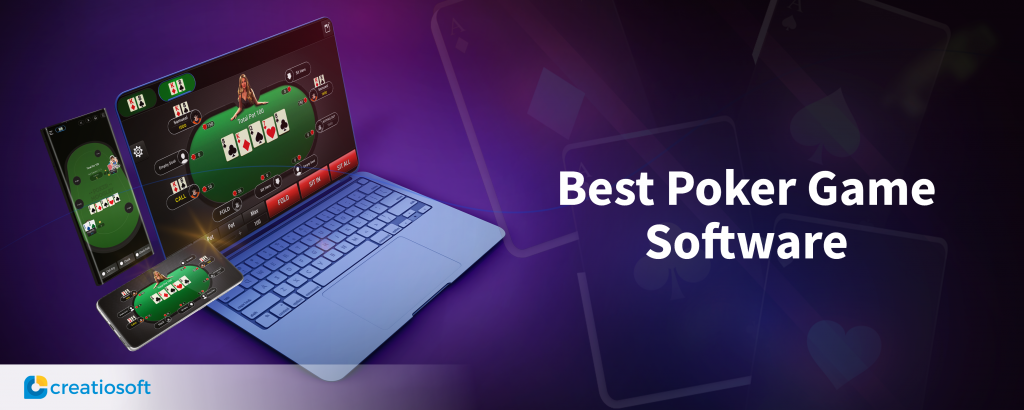In the world of online gaming, poker has long been a beloved pastime for players worldwide. “With the rise of Web3 technology, poker software is undergoing a revolutionary transformation. So, what exactly is Web3 poker software, and how does it differ from traditional online poker software for sale? This blog post delves into the potential of Web3 poker software and how it is poised to reshape the way we play and experience poker online.
Introduction:
In the realm of online gaming, poker has long held a prestigious position as one of the most popular and enduring games of skill and strategy. However, as technology reshapes industries globally, online poker experiences a profound transformation. Whether you’re new to the game or an experienced player, this guide has what you need. It explains all you need to know about the best online poker software for sale. This is driven by the emergence of Web3 technology. This revolutionary shift promises to unlock new possibilities and enhance player experiences. It also redefines the very essence of online poker as we know it.
Gone are the days when online poker was solely confined to centralized platforms. These platforms were governed by opaque algorithms and controlled by intermediaries. With the advent of Web3 technology, powered by blockchain and decentralized protocols, a new era of poker software is dawning. Web3 poker software represents a departure from traditional models. It provides players with unmatched transparency, fairness, and autonomy in their gaming experiences.
In this exploration of Web3 poker software, we uncover its vast potential and how it stands to revolutionize the world of online poker. Exploring Web3 poker software features decentralization, provably fair gameplay, tokenization, and more. It offers insights into its benefits, challenges, and future prospects. Join us as we explore the exciting world of Web3 poker and its transformative impact on the future of online gaming. We provide the idea of the suitable platform if you are looking to buy poker software with Texas Holdem.
What is Web3 Poker Software?
Web3 poker software refers to online poker platforms that utilize Web3 technology. This technology is built on decentralized protocols and blockchain. This innovative approach ensures greater transparency and security in online poker operations.
Web3 poker software operates on a decentralized network of computers. This decentralized structure enhances transparency, security, and fairness in online poker gameplay.
This decentralized structure offers several advantages. It includes enhanced transparency, security, and trust among players.
Web3 poker software integrates provably fair gameplay, tokenization, smart contracts, and community governance. These elements revolutionize the online poker experience. As the technology continues to mature and gain adoption, we can expect to see even more innovative features and functionalities emerge, further enhancing the future of online poker software for sale.
Key Features of Web3 Poker Software:
● Decentralization:
Web3 poker software operates on decentralized networks. It eliminates the need for intermediaries and centralized control. Players can directly take part in games on the blockchain. This ensures transparency, security, and censorship resistance.
● Provably Fair Gameplay:
Utilizing cryptographic algorithms and smart contracts, Web3 poker software enables provably fair gameplay. Every action, from card shuffling to game outcomes, is verifiable on the blockchain. This ensures that games are conducted fairly and transparently.
● Tokenization:
Web3 poker software leverages blockchain-based tokens to represent in-game assets, currencies, and rewards. Players can use cryptocurrencies or native tokens to play, earn rewards, and trade assets. These transactions occur on decentralized exchanges.
● Community Governance:
Many Web3 poker platforms incorporate decentralized governance mechanisms. This enables players to participate in platform decision-making processes. Players influence the platform’s direction and development through voting and governance tokens.
● Interoperability:
Web3 poker software often integrates with various decentralized applications (DApps) and protocols. This facilitates seamless interaction within the blockchain ecosystem. This allows for seamless integration with other gaming platforms, financial services.
● Enhanced Privacy:
With Web3 poker software, players can enjoy enhanced privacy and anonymity. Transactions and interactions are pseudo-nymous. This offers players enhanced privacy compared to traditional centralized platforms.
● Cross-Platform Compatibility:
Web3 poker software works seamlessly on web browsers, mobile devices, and desktop applications. This ensures players can join games anytime, anywhere, for greatest convenience.
● Smart Contract Automation:
Smart contracts are integral to Web3 poker software. They automate gameplay aspects like fund transfers, rule enforcement, and dispute resolution. Smart contracts drop the need for intermediaries and ensure trustless interactions between players.
● Immutable Game History:
Every transaction and game outcome on Web3 poker software is recorded on the blockchain. This creates an immutable and transparent game history. Players can review past games, transactions, and outcomes with confidence. They know that the data is tamper-proof and verifiable
● Developer-Friendly APIs:
Web3 poker software often provides developer-friendly APIs (Application Programming Interfaces). These APIs allow third-party developers to create & launch custom applications, plugins, and integrations on the platform. This fosters innovation and ecosystem growth within the Web3 poker community.

Benefits of Web3 Poker Software:
● Enhanced Security:
With blockchain’s security features, Web3 poker software ensures protection against fraud and manipulation.
● Global Accessibility:
The decentralized nature allows global participation in games without geographical restrictions or censorship.
● Ownership of Assets:
Players have true ownership of their in-game assets, such as tokens, collectibles, and winnings. This fosters a sense of ownership and investment in the platform
Challenges and Considerations:
● Scalability:
As with any emerging technology, scalability remains a challenge for Web3 poker software. This is particularly concerning about transaction throughput and network congestion
● Regulatory Compliance:
Navigating the regulatory landscape of decentralized gaming poses challenges. It requires adherence to legal frameworks and compliance with jurisdictional regulations.
● User Experience:
Balancing decentralization with user-friendly interfaces and seamless gameplay is essential. It ensures mass adoption of Web3 poker software.
The Future of Web3 Poker Software:
● Continued Innovation:
As Web3 technology evolves, we can expect ongoing innovation in Web3 poker software. This includes advancements in scalability, interoperability, and user experience.
● Mainstream Adoption:
With increasing interest in blockchain technology and decentralized finance (DeFi), Web3 poker software is set for mainstream adoption. It attracts both casual and professional players alike.
● Shaping the Future of Online Poker:
Web3 poker software has the potential to redefine the online poker industry. It offers players a more transparent, secure, and rewarding gaming experience.

Conclusion:
Selecting the best online poker software for sale is an important step towards improving your gaming experience. The exploration of Web3 poker software shows how it can transform the poker industry. Web3 poker software leverages blockchain and decentralized networks, offering innovative features. These address the limitations of traditional online poker platforms. Web3 poker software shifts the paradigm with decentralization, fair gameplay, tokenization, & community governance. It aims towards a more transparent, secure, and inclusive gaming environment.
Additionally, Web3 poker software offers increased accessibility and convenience for players. It offers interoperability, enhanced privacy, and cross-platform compatibility. This is regardless of their location or device. The automation through smart contracts streamlines gameplay. It eliminates intermediaries and boosts trust and efficiency in gaming.”
Moreover, the immutable game history and APIs of Web3 poker software foster transparency, innovation, and ecosystem growth. This benefits the Web3 poker community as a whole. As technology evolves, Web3 poker software will increasingly reshape the future of online poker. It offers players unique chances for engagement, rewards, and involvement in a decentralized gaming ecosystem. Creatisoft will serve you best if you are looking to buy poker software with Texas Holdem.

FAQs:
- How does Web3 Poker Software differ from conventional poker platforms?
Web3 poker software introduces decentralization, provably fair gameplay, tokenization, and community governance. These aspects address the limitations of traditional online poker platforms. It emphasizes transparency, security, and player empowerment.
- What are the key benefits of using Web3 Poker Software?
Some key benefits of Web3 poker software include greater transparency and enhanced security. It also provides immutable game history and automation through smart contracts. Additionally, it offers interoperability, privacy, and cross-platform compatibility. These features offer players unprecedented opportunities for engagement, rewards, and participation. They contribute to a decentralized gaming ecosystem.
- How are transactions handled in Web3 Poker Software?
Transactions in Web3 poker software are executed through blockchain networks. They use cryptocurrency tokens or digital assets. Smart contracts ease automated payment processing, eliminating the need for intermediaries. They ensure secure, tamper-proof transactions.
- Can players retain ownership of their in-game assets in Web3 Poker Software?
Yes, Web3 poker software enables players to keep ownership of their in-game assets, such as virtual chips, NFT and digital collectibles. These assets are stored on blockchain networks, allowing players to transfer, trade, or sell them freely.
- What scalability solutions are implemented in Web3 Poker Software?
Web3 poker software improves scalability and speed using layer 2 scaling solutions like sidechains, state channels, and off-chain protocols. These technologies reduce transaction fees, delays, and network congestion, providing smoother gameplay.
- How can developers contribute to the development of Web3 Poker Software?
Developers can contribute to Web3 poker software development by joining open-source projects, creating decentralized applications (DApps) and smart contracts. They can also conduct security audits and propose protocol enhancements. Collaboration within the Web3 poker community drives innovation and ecosystem growth.









